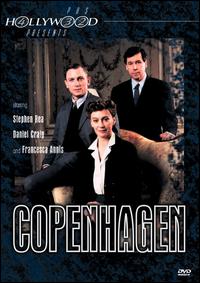Copenhagen (2002 film)
Copenhagen is a 2002 British television film adaptation of the play of the same name by Michael Frayn. The film is directed by Howard Davies and stars Daniel Craig, Stephen Rea, and Francesca Annis. It delves into the historical meeting between the physicists Niels Bohr and Werner Heisenberg in Copenhagen during World War II, exploring the complexities of physics, friendship, and morality. The narrative is heavily influenced by the themes of quantum mechanics and the uncertainty principle, reflecting on how these principles apply to human relationships and ethical dilemmas.
Plot[edit | edit source]
The film follows the speculative account of the meeting between Niels Bohr, a Danish Jew, and Werner Heisenberg, a German working on the Nazi atomic bomb project, in Copenhagen in 1941. The story is recounted through the interactions between Bohr, Heisenberg, and Bohr's wife Margrethe, to whom Heisenberg was like a son before the war. The dialogue explores the reasons behind Heisenberg's visit and the ethical implications of their work on nuclear weapons. The narrative structure is non-linear, with the characters revisiting past events from multiple perspectives, emphasizing the uncertainty and complexity of their memories and motivations.
Cast[edit | edit source]
- Daniel Craig as Werner Heisenberg
- Stephen Rea as Niels Bohr
- Francesca Annis as Margrethe Bohr
Production[edit | edit source]
The film was produced for television and aired on the BBC in the United Kingdom. It was directed by Howard Davies, who had a distinguished career in both theatre and television. The screenplay was adapted by Michael Frayn from his own award-winning play, which had received critical acclaim for its thought-provoking content and innovative structure.
Reception[edit | edit source]
Copenhagen received positive reviews for its intelligent script, compelling performances, and the way it handled complex scientific and moral issues. Critics praised the film for bringing a challenging theatrical work to the screen without losing the depth and nuance of the original play. The performances of Craig, Rea, and Annis were particularly highlighted for their ability to convey the emotional and intellectual intensity of their characters' dialogue.
Themes[edit | edit source]
The film explores several themes, including the moral responsibility of scientists, the impact of friendship on professional relationships, and the nature of memory and interpretation. It also delves into the philosophical implications of quantum mechanics, particularly the uncertainty principle, as a metaphor for the unpredictability and subjectivity of human actions and motivations.
See Also[edit | edit source]
Search WikiMD
Ad.Tired of being Overweight? Try W8MD's physician weight loss program.
Semaglutide (Ozempic / Wegovy and Tirzepatide (Mounjaro / Zepbound) available.
Advertise on WikiMD
|
WikiMD's Wellness Encyclopedia |
| Let Food Be Thy Medicine Medicine Thy Food - Hippocrates |
Translate this page: - East Asian
中文,
日本,
한국어,
South Asian
हिन्दी,
தமிழ்,
తెలుగు,
Urdu,
ಕನ್ನಡ,
Southeast Asian
Indonesian,
Vietnamese,
Thai,
မြန်မာဘာသာ,
বাংলা
European
español,
Deutsch,
français,
Greek,
português do Brasil,
polski,
română,
русский,
Nederlands,
norsk,
svenska,
suomi,
Italian
Middle Eastern & African
عربى,
Turkish,
Persian,
Hebrew,
Afrikaans,
isiZulu,
Kiswahili,
Other
Bulgarian,
Hungarian,
Czech,
Swedish,
മലയാളം,
मराठी,
ਪੰਜਾਬੀ,
ગુજરાતી,
Portuguese,
Ukrainian
Medical Disclaimer: WikiMD is not a substitute for professional medical advice. The information on WikiMD is provided as an information resource only, may be incorrect, outdated or misleading, and is not to be used or relied on for any diagnostic or treatment purposes. Please consult your health care provider before making any healthcare decisions or for guidance about a specific medical condition. WikiMD expressly disclaims responsibility, and shall have no liability, for any damages, loss, injury, or liability whatsoever suffered as a result of your reliance on the information contained in this site. By visiting this site you agree to the foregoing terms and conditions, which may from time to time be changed or supplemented by WikiMD. If you do not agree to the foregoing terms and conditions, you should not enter or use this site. See full disclaimer.
Credits:Most images are courtesy of Wikimedia commons, and templates Wikipedia, licensed under CC BY SA or similar.
Contributors: Prab R. Tumpati, MD

